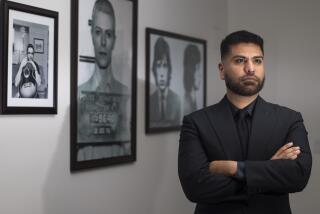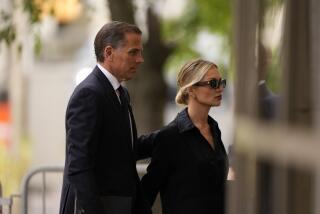John Edwards appears confident as defense rests in his trial
GREENSBORO, N.C. — His political career is wrecked, his reputation is destroyed. He poisoned his marriage, and his martyred wife died knowing he cheated on her and lied about it to the world.
And yet Johnny Reid Edwards has behaved as if he owns the courtroom where the Justice Department has been prosecuting him the last three weeks. He strides into court, his face tanned, his hair perfectly in place, his suit crisp. He grabs his counsel’s arm and orders him to object to a prosecutor’s question. He whispers to his lawyers, writes furiously on a legal pad and studies the jurors who hold his fate.
Edwards, a honey-voiced North Carolina lawyer who made his fortune persuading juries to award huge sums to injured clients, is accustomed to winning in courtrooms. And on Wednesday, as his lawyers rested their case after calling just seven of the 65 people on their witness list, he projected confidence that he will once again prevail.
His legal team is betting that, although evidence portrayed Edwards as a cad, prosecutors didn’t prove that he broke federal campaign finance laws in an attempt to cover up an affair.
The end came without the dramatic testimony of the defendant himself. Also absent from the stand were Edwards’ oldest daughter, Cate, a lawyer herself, and Rielle Hunter, the mistress who had previously unburdened herself on “Oprah.”
The two sides will make closing arguments Thursday. After the judge instructs the jury, deliberations could begin Friday.
In charging Edwards with six counts of violating campaign finance laws, the government says he accepted $925,000 in illegal contributions to cover up the affair and save his 2008 presidential campaign from scandal, and then conspired to lie about it.
Edwards’ attorneys say the money, provided by two wealthy benefactors, was private gifts designed to hide the affair from his wife, Elizabeth. They say Edwards didn’t know about the payments, that they were solicited by former aide Andrew Young as part of a scam to benefit Young and his wife.
The government must prove that Edwards knew about the payments and knew he was breaking the law.
Edwards, a former Democratic senator from North Carolina and 2004 vice presidential nominee, met Hunter, who had been hired as a campaign videographer, in the run-up to the party’s 2008 presidential election.
In court, that affair has played out with a cinematic flourish, beginning with the initial tryst in a hotel bar and featuring jackals from the tabloid press always in hot pursuit.
Testimony emphasized the more outrageous elements:
Young, Edwards’ adoring Sancho Panza, falsely claimed — at Edwards’ behest — to be the father of Frances Quinn Hunter, the daughter born to Edwards and Hunter in 2008. Earlier, he recounted, Edwards had told him that Hunter was “a crazy slut” and that there was only a 1-in-3 chance the baby was his.
Hunter and the baby were even taken on madcap cross-country flights to hide them from the National Enquirer.
Elderly billionaire heiress Rachel “Bunny” Mellon wrote more than $700,000 in “Bunny Money” checks for “furniture” to an interior decorator who turned them over to Young and his wife, Cherie.
The Hunters reportedly concocted fake expense reports, saying they needed money from Edwards’ benefactor Fred Baron, a wealthy Texas lawyer, to buy Hunter a $28,000 BMW; in fact, according to testimony, they’d already bought the car with Bunny Money.
They also allegedly used much of Mellon’s and Baron’s money to build a $1.6-million mansion in Chapel Hill, N.C., while embarking on vacations and shopping sprees with money they claimed to have spent on Hunter.
Then there was the testimony about Elizabeth Edwards, who reportedly stripped off her blouse and bra at an airport, collapsing in rage and grief as she confronted her unfaithful husband. (That searing tale prompted Cate Edwards to bolt from the courtroom in tears, her father calling after her, “Cate ... Cate.”)
A confidant of Elizabeth Edwards told jurors that Edwards, dying of cancer, feared that “when she died, there would not be a man around who loved her.”
The interior decorator testified about Mellon’s belated realization that her money was helping hide a sexual dalliance: “Maybe you should pay for your girlfriend yourself,” Mellon reportedly told Edwards.
Voicemails from Edwards were featured as well, portraying him as a scheming, duplicitous politician conniving to save himself from scandal. So was a court exhibit documenting Hunter’s menstrual cycle and likely conception date (between May 25 and May 28, 2007).
Even the infamous $400 Edwards haircut in 2007 was resurrected because the Edwards campaign claimed it as a campaign expense.
And finally, the damning coda to the prosecution case arrived: a riveting 2008 interview with ABC News, played in the courtroom last week. And Edwards, silent and suffering, was forced to watch himself lie on national TV as his smiling TV image boldly proclaimed that the affair was long over and the baby wasn’t his.
Although the prosecution’s three-week case featured ribald tales of an illicit affair and alleged lies and schemes by Edwards, the defense clung to a granular dissection of complex campaign finance law.
Edwards has bet his freedom on a technical interpretation.
His team seemed buoyed by defense testimony designed to destroy the Youngs’ credibility, and to convince jurors that the Mellon and Baron payments were not campaign contributions. Defense lawyers fought to introduce evidence that the Federal Election Commission, the alleged victim, does not consider the payments campaign contributions, even though the Justice Department does.
Edwards’ chief financial officer for the 2008 campaign testified that FEC auditors did not require her to report the money to the agency, even after Edwards was indicted. And a former FEC commissioner testified that never in his 37 years dealing with FEC law had a campaign been charged with a crime involving private third-party payments for personal expenses.
At times during the trial, Edwards has gotten up and paced just beyond the court bar, sucking on a mint. But mostly, he has sat regally at the defense table, deep in thought, reading court documents.
Edwards’ parents, pale and frail, have sat behind their son throughout the trial, ever loyal. So has Cate Edwards, who has accompanied her father most days on the dreaded gantlet past TV cameras at the courthouse doorway.
By Wednesday, with a grateful jury liberated early for lunch by U.S. District Judge Catherine Eagles, Edwards and his legal team sat plotting their final strategy in the wood-paneled courtroom.
Beyond the courtroom, the question remains: Why would a presidential candidate whose handsome face was known to millions think he could get away with an affair in the digital age of around-the-clock news?
It could have been narcissism, a term invoked by Edwards himself in the now-damning ABC interview. It could have been hubris, for Edwards had soared from humble beginnings. He was the son of millworker in the tiny textile town of Robbins, not far from the federal courthouse in Greensboro, and rose to become a U.S. senator and vice presidential nominee.
“It made me wonder: Did he really want to be president?” said Hampton Dellinger, a North Carolina lawyer who has taught campaign law at Duke University.
Dellinger, who remembers cramming into courtrooms with other young lawyers to watch in awe as Edwards performed closing arguments, said no one had ever been tried on the charges leveled against Edwards. He’s the most prominent lawyer put on trial since Clarence Darrow, Dellinger said.
Gary Pearce, a Democratic consultant who was among Edwards’ most fervent supporters when he worked on his 1998 U.S. Senate race, remembers people in Raleigh telling him that Edwards was a phony. He defended Edwards then, but now wonders how the man he so admired had turned so craven.
“A friend of his once called him a ‘seducer,’ in an emotional sense even more than sexual,” Pearce said in an email conversation. “He had a magic touch with people. He could draw them to him.... That’s heady stuff. Some people can’t keep it in perspective, and that power eventually destroys them.”
As for the affair itself, Pearce said: “Elizabeth could be very caustic and critical, of him and everybody.... Maybe he was seeking the approval and adoration that Hunter gave him.”
His old friend is not beyond redemption, Pearce said. “I got to know his parents a bit, and he was raised better than this.”
Wade Smith, a legendary North Carolina criminal lawyer who hired a young Edwards, testified that Edwards was the hardest-working lawyer he’d ever known. By the time other lawyers realized Edwards had been staying up all night to outwork them, Smith said, it was too late.
This week, John Edwards was hard at work again, studying the faces of jury members returning from lunch. He bent forward, his smooth face creased by concentration. He whispered instructions to his lawyers, fighting what could be his last, best day in court.
More to Read
Sign up for Essential California
The most important California stories and recommendations in your inbox every morning.
You may occasionally receive promotional content from the Los Angeles Times.











